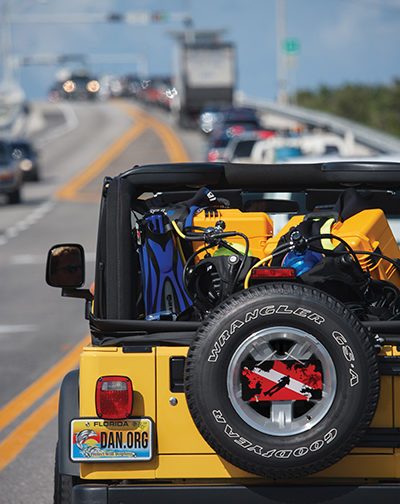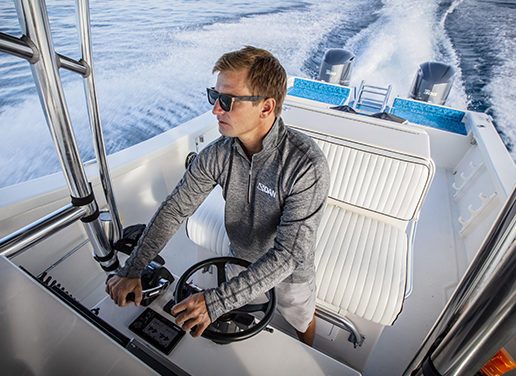VEHICLE
SAFETY

SOME DIVE PROFESSIONALS may be in the habit of transporting their clients or students to the dive site or the dock using their own vehicle. In many places, however, motor vehicle driving licenses and insurance coverage do not apply when transferring fare-paying passengers. If you charge for your dive services, this likely extends to all the activities you expose clients to.
This is but one of several considerations that dive operators and professionals need to consider when using vehicles for their business. Here are some issues for you to reflect upon to protect yourself and your business.
REGISTRATION
OR LICENSING
The use of vehicles for transporting customers or for other business-related purposes requires compliance with all applicable regulations. If all relevant regulations are not followed, dive operators or professionals may be subject to legal action and/or claims for injuries or damages. The same applies to vehicle liability insurance coverage where policies differ between personal and professional use. All regulations and insurance requirements should be considered, even when you may not consider that clients are paying you for transportation. Payment may be direct or indirect. The key is if it is part of the service you are offering or your clients have an expectation that it is included.
POLICY REGARDING
ALCOHOL AND DRUG USE
Even in more relaxed diving locations where the use of recreational drugs may be ignored, dive operators may be held liable for accidents that occur when the driver is under the influence of alcohol or drugs. The key to avoiding this situation is a clear policy and, more importantly, enforcement of this policy. Transgressions should be dealt with formally and documented. Notify staff that you as the business operator have the right to periodically screen staff for the presence of any alcohol or drugs in their system.
VEHICLE EMERGENCY
ACTION PLANNING
We are perhaps accustomed to expecting and dealing with a vehicle accident; however, in the event of conducting business, additional risks are involved. Consider unexpected emergencies such as vehicle seizure, arrest of the driver, or aggressive behavior by a client. Realistic and well-thought-through emergency action plans are needed in order to prepare and empower you and your staff to deal with the unexpected.

VEHICLE SAFETY
ELEMENT
Use of seat belts
RISKS
The use of seat belts is mandatory in most jurisdictions.
Even though many dive sites are located away from public roads, the protection of passengers remains the responsibility of the dive operator.
RECOMMENDATIONS
Failure to enforce relevant seat belt laws may subject operators to legal liability. Dive operators should ensure that passengers in vehicles owned by the business use their seat belts in the following circumstances:
- if the vehicle is being driven on a public road or in public areas; or
- if the vehicle is capable of being driven faster than 15 miles per hour (20 kilometers per hour).
Noncompliant passengers should be instructed to use their seat belts.
Drivers should be allowed to refuse to transport any passenger who does not comply with seat belt instructions.
Cylinder-transport procedures
If high-pressure cylinders are handled improperly or roughly during loading, transport, or unloading, there is a risk of rupture and uncontrolled release of compressed air.
If damage or injury occurs as a result of such a breach, dive operators may be subject to legal and/or financial liability.
Dive operators should ensure that cylinders are transported in a suitable vehicle, such as a truck; are placed outside the driver/passenger compartment; and are secured to minimize cylinder movement and damage to valves.
Care should be taken to avoid dropping, banging, or otherwise abusing cylinders.
Cylinders should not be exposed to extreme heat or stored in a vehicle for long periods.
DAN Customer Service
Mon–Fri, 8:30 a.m. – 5 p.m. ET
+1 (919) 684-2948
+1 (800) 446-2671
Fax: +1 (919) 490-6630
24/7 Emergency Hotline
In event of a dive accident or injury, call local EMS first, then call DAN.
24/7 Emergency Hotline:
+1 (919) 684-9111
(Collect calls accepted)
DAN must arrange transportation for covered emergency medical evacuation fees to be paid.
Medical Information Line
Get answers to your nonemergency health and diving questions.
Mon–Fri, 8:30 a.m. – 5 p.m. ET
+1 (919) 684-2948, Option 4
Online: Ask A Medic
(Allow 24-48 hours for a response.)

